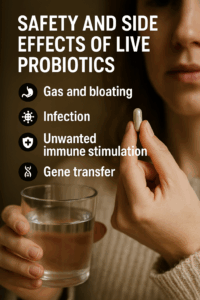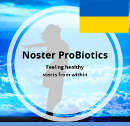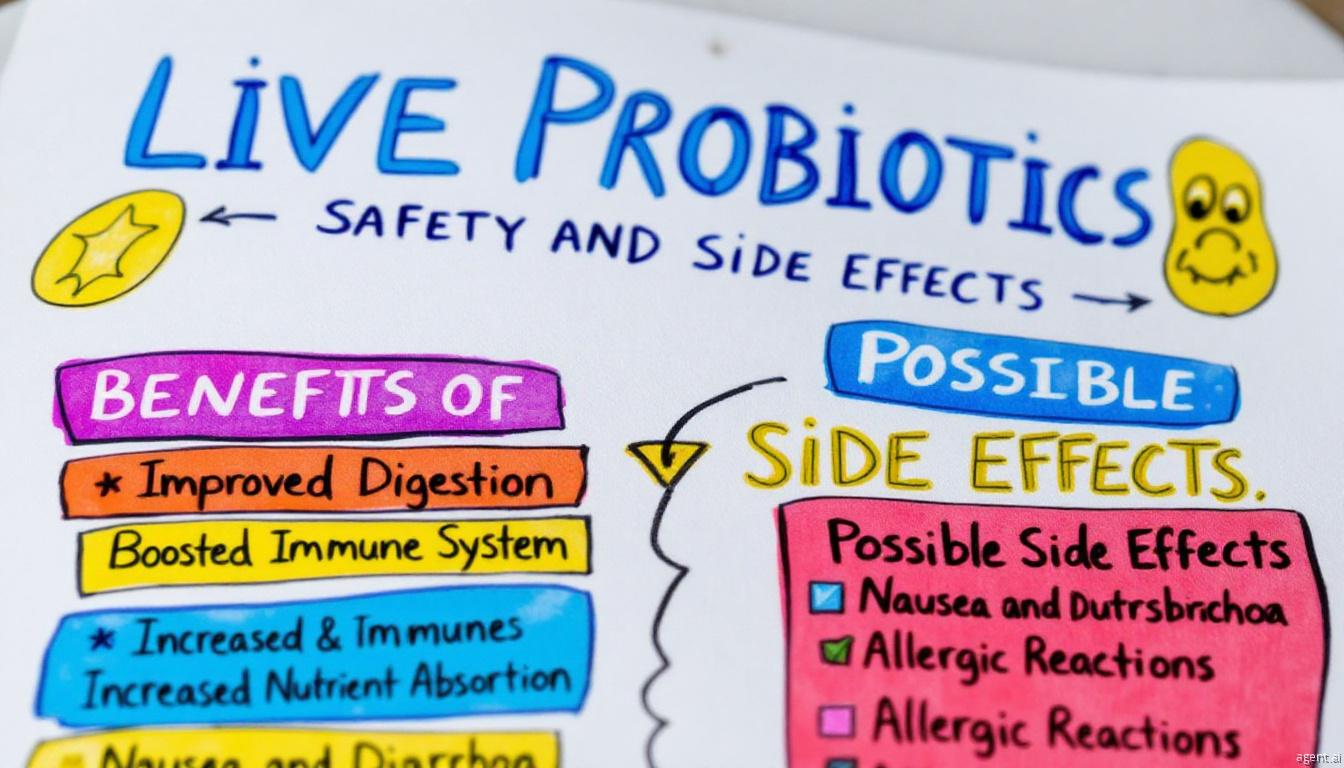Introduction
Have you ever wondered about the safety and side effects of live probiotics? With the increasing popularity of these beneficial bacteria, it’s essential to understand their advantages and potential risks.
What are Live Probiotics?
Live probiotics, often referred to simply as probiotics, are living microorganisms that can confer health benefits to the host (typically humans) when consumed in appropriate amounts. These beneficial bacteria and yeasts are crucial in maintaining a balanced gut microbiome, a community of microorganisms living in our intestines.
Origins and Types
Probiotics are naturally present in our bodies and can also be found in various external sources. The most common types of probiotics include Lactobacillus and Bifidobacterium. Each has different species and strains that offer multiple benefits.
Sources of Live Probiotics
-
Fermented Foods: Many cultures worldwide have been consuming fermented foods for centuries. These foods naturally contain probiotics. Examples include:
- Yoghurt: Perhaps the most well-known source, yoghurt is made by fermenting milk with live bacteria.
- Sauerkraut: Fermented cabbage, rich in both probiotics and vitamins.
- Kimchi: A Korean dish made from fermented vegetables.
- Kefir: A fermented milk drink, similar to yoghurt but with a thinner consistency.
- Miso and Tempeh: Fermented soy products popular in Japanese cuisine.
-
Dietary Supplements: Supplements are available in capsule, tablet, liquid, and powder forms for those who don’t consume enough probiotics through their diet.
Benefits of Live Probiotics
-
Digestive Health: Probiotics help balance good and bad bacteria in the gut. This balance is crucial for digesting food, producing vitamins, and preventing diarrhoea or constipation.
-
Immune System Support: A healthy gut microbiome can boost the immune system, helping the body fend off infections.
-
Mental Health: Emerging research suggests a connection between gut health and mental health, often called the “gut-brain axis”. Probiotics might play a role in managing depression and anxiety.
Considerations When Choosing Probiotics
When selecting a probiotic, it’s essential to:
-
Check the Strain: Not all probiotics are the same. Different strains offer different benefits, so choose one that meets your needs.
-
Consider the CFU: This stands for “colony-forming units” and indicates the number of live organisms in the product. A higher CFU doesn’t necessarily mean a better product but gives an idea of its potency.
-
Storage: Some probiotics need refrigeration to keep the bacteria alive, while others are shelf-stable. Always check the storage instructions.
The Benefits of Live Probiotics
Probiotics, often termed “good bacteria,” have been the subject of extensive research over the past few decades. Their positive impact on health is multifaceted, with the following being some of the most notable benefits:
1. Digestive Health
-
Balancing Gut Flora: Our gut has trillions of beneficial and harmful bacteria, such as Lactobacillus casei. Probiotics help maintain a healthy balance by increasing the number of good bacteria, which can outcompete the harmful ones. This equilibrium is essential for optimal gut function.
-
Aiding Digestion: Probiotics assist in breaking down food and absorbing nutrients. They can help digest complex carbohydrates our bodies can’t digest independently, turning them into beneficial short-chain fatty acids.
-
Preventing Gastrointestinal Issues: Probiotics can alleviate symptoms of irritable bowel syndrome (IBS), reduce gas, bloating, and constipation. They can also help manage conditions like Crohn’s disease and ulcerative colitis.
-
Combating Diarrhoea: Whether caused by infections, antibiotics, or travel, diarrhoea can be mitigated with probiotics. They restore the gut’s natural balance after it’s been disrupted.
2. Immune System Boost
-
Enhancing Barrier Function: Probiotics enhance the body’s natural defence mechanism by reinforcing the mucosal barrier in the gut. This barrier prevents harmful pathogens from entering the bloodstream.
-
Producing Natural Antibiotics: Some probiotics produce substances known as bacteriocins, which act as natural antibiotics to kill harmful bacteria.
-
Stimulating Immune Cells: Probiotics can boost the activity of immune cells like macrophages, T lymphocytes, and natural killer cells. This makes the immune system more robust and responsive to potential threats.
-
Reducing Inflammation: Chronic inflammation is linked to numerous diseases. Probiotics can reduce the production of inflammatory cytokines, helping manage conditions like inflammatory bowel disease, allergies, and even some autoimmune disorders.
-
Preventing Infections: By occupying space and consuming resources in the gut, probiotics prevent harmful pathogens from establishing a foothold. This can reduce the risk of infections like urinary tract infections, vaginal yeast infections, and respiratory infections.
Potential Side Effects of Probiotics
While probiotics are generally considered safe and beneficial for most people, they can sometimes cause side effects. Here’s a more detailed look at the potential adverse effects:
1. Digestive Symptoms
-
Gas and Bloating: One of the most common side effects of starting probiotics is increased gas production in the gut. This is because, as probiotics begin to restore the natural balance of gut bacteria, they might produce gas as a byproduct of fermenting certain foods.
-
Stomach Upset: Some individuals might experience stomach discomfort, including cramping or a feeling of fullness, especially when starting a high dose of probiotics.
-
Change in Bowel Movements: Probiotics can sometimes lead to changes in bowel habits, including constipation or, conversely, loose stools. This is typically temporary as the body adjusts.
2. Infections
-
Risk for Immunocompromised Individuals: People with weakened immune systems, such as those undergoing chemotherapy, with HIV/AIDS, or on immunosuppressive medications, are at a higher risk of developing infections from probiotics. In rare cases, the live bacteria in probiotics can enter the bloodstream and cause infections.
-
Fungal Infections: There have been rare reports of individuals developing fungal (yeast) infections after taking probiotics, especially if underlying conditions make them susceptible.
3. Overstimulation of the Immune System
-
Immune Response: While probiotics can boost the immune system, they might sometimes overstimulate it. This can lead to an exaggerated immune response, causing symptoms like fever, fatigue, or skin rashes.
-
Autoimmune Reactions: There’s a theoretical risk that probiotics could trigger autoimmune reactions in susceptible individuals, where the immune system mistakenly attacks healthy cells.
-
Exacerbation of Immune-related Conditions: When taking probiotics, individuals with conditions like lupus, rheumatoid arthritis, or other immune system disorders might experience flare-ups or worsening symptoms.
Precautions and Recommendations:
-
Start Slowly: If you’re new to probiotics, consider starting with a lower dose and gradually increasing it. This can help your body adjust and reduce the risk of side effects.
-
Consult a Healthcare Professional: Before starting probiotics, it’s essential to consult with a healthcare professional, especially if you have underlying health conditions, are pregnant, or are taking medications.
-
Choose Reputable Brands: Ensure you choose high-quality probiotics from reputable brands. Look for products that have been third-party tested for potency and purity.
Who Should Be Cautious?
Individuals with compromised immune systems, the elderly, and those with underlying health conditions should consult a healthcare professional before starting any probiotic regimen.
How to Choose the Right Probiotic
When selecting a probiotic, consider:
- The strain of the probiotic
- The CFU (colony-forming units) count
- Any certifications or third-party testing
FAQs
-
Are all probiotics safe to consume?
While most are safe, choosing reputable brands and consulting with a healthcare professional is essential. -
How often should I take probiotics?
This varies based on the product and individual needs. Always follow the recommended dosage. -
Can children take probiotics?
Yes, but choosing products formulated for children and consulting with a paediatrician is crucial. -
Are there any foods that naturally contain probiotics?
Yes, foods like yoghurt, sauerkraut, and kimchi are rich in live probiotics. -
What should I do if I experience side effects?
Discontinue use and consult with a healthcare professional.

